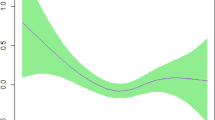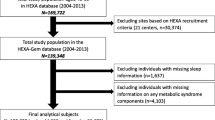Abstract
This study aims to explore the interaction of sleep quality, family history of type 2 diabetes, and obesity in relation to impaired fasting glucose in a Chinese population. A representative population-based cross-sectional study was conducted, and 15,145 residents aged between 18 and 75 years were selected from 11 districts of Xuzhou City, Jiangsu Province. The Pittsburgh Sleep Quality Index was used to evaluate sleep conditions, with categories of good and poor. Impaired fasting glucose (IFG) was assessed by fasting blood glucose. Interaction of sleep quality, obesity, and family history of diabetes (FHD) on IFG was analyzed by logistic regression. Relative excess risk due to interaction (RERI) and the synergy index (SI) were applied to evaluate the additive interaction between the two factors. Either poor sleep or positive FHD was independently associated with an increased odds ratio (OR) for IFG. Those with both poor sleep and positive FHD had a significantly increased risk compared with those without poor sleep and FHD (OR 20.6, 95 % confidence interval (CI) 16.4–29.0, P < 0.001). The corresponding RERI and SI was 14.6 (8.6–20.6) and 3.7 (1.4–5.1), respectively. Both abdominal obesity and FHD significantly increased the risk of being IFG. The synergistic effect of abdominal obesity and FHD on IFG was statistically significant (OR 40.1, 95 % CI 28.8–61.5). The results suggest that additive interactions exist between poor sleep quality, abdominal obesity, and family history of diabetes in relation to impaired fasting glucose.
Similar content being viewed by others
References
Gottlieb DJ, Punjabi NM, Newman AB, Resnick HE, Redline S, Baldwin CM, et al. Association of sleep time with diabetes mellitus and impaired glucose tolerance. Arch Intern Med. 2005;165(8):863–7. doi:10.1001/archinte.165.8.863.
Hayashino Y, Fukuhara S, Suzukamo Y, Okamura T, Tanaka T, Ueshima H. Relation between sleep quality and quantity, quality of life, and risk of developing diabetes in healthy workers in Japan: the High-risk and Population Strategy for Occupational Health Promotion (HIPOP-OHP) Study. BMC Public Health. 2007;7:129. doi:10.1186/1471-2458-7-129.
Mallon L, Broman JE, Hetta J. High incidence of diabetes in men with sleep complaints or short sleep duration: a 12-year follow-up study of a middle-aged population. Diabetes Care. 2005;28(11):2762–7.
Nilsson PM, Roost M, Engstrom G, Hedblad B, Berglund G. Incidence of diabetes in middle-aged men is related to sleep disturbances. Diabetes Care. 2004;27(10):2464–9.
Yaggi HK, Araujo AB, McKinlay JB. Sleep duration as a risk factor for the development of type 2 diabetes. Diabetes Care. 2006;29(3):657–61.
Buxton OM, Pavlova M, Reid EW, Wang W, Simonson DC, Adler GK. Sleep restriction for 1 week reduces insulin sensitivity in healthy men. Diabetes. 2010;59(9):2126–33. doi:10.2337/db09-0699.
Donga E, van Dijk M, van Dijk JG, Biermasz NR, Lammers GJ, van Kralingen KW, et al. A single night of partial sleep deprivation induces insulin resistance in multiple metabolic pathways in healthy subjects. J Clin Endocrinol Metab. 2010;95(6):2963–8. doi:10.1210/jc.2009-2430.
Spiegel K, Knutson K, Leproult R, Tasali E, Van Cauter E. Sleep loss: a novel risk factor for insulin resistance and type 2 diabetes. J Appl Physiol (1985). 2005;99(5):2008–19. doi:10.1152/japplphysiol.00660.2005.
Stamatakis KA, Punjabi NM. Effects of sleep fragmentation on glucose metabolism in normal subjects. Chest. 2010;137(1):95–101. doi:10.1378/chest.09-0791.
Li G, Zhang P, Wang J, Gregg EW, Yang W, Gong Q, et al. The long-term effect of lifestyle interventions to prevent diabetes in the China Da Qing Diabetes Prevention Study: a 20-year follow-up study. Lancet. 2008;371(9626):1783–9. doi:10.1016/S0140-6736(08)60766-7.
Lou P, Chen P, Yu J, Zhang N, Zhang P. Analysis on the risk factors of the residents with impaired fasting glucose in Xuzhou. Chin J Dis Control Prev. 2011;15(3):192–5.
Yang SH, Dou KF, Song WJ. Prevalence of diabetes among men and women in China. N Engl J Med. 2010;362(25):2425–6. author reply 6.
Rahim MA, Khan AK, Ali SM, Nahar Q, Shaheen A, Hussain A. Glucose tolerance in a rural population of Bangladesh. Int J Diabetes Dev Ctries. 2008;28(2):45–50. doi:10.4103/0973-3930.43098.
Rafalson L, Donahue RP, Stranges S, Lamonte MJ, Dmochowski J, Dorn J, et al. Short sleep duration is associated with the development of impaired fasting glucose: the Western New York Health Study. Ann Epidemiol. 2010;20(12):883–9. doi:10.1016/j.annepidem.2010.05.002.
Kish L. A procedure for objective respondent selection within the household. J Am Stat Assoc. 1949;44(247):380–7.
Buysse DJ, Reynolds 3rd CF, Monk TH, Berman SR, Kupfer DJ. The Pittsburgh Sleep Quality Index: a new instrument for psychiatric practice and research. Psychiatry Res. 1989;28(2):193–213.
American Diabetes Association. Diagnosis and classification of diabetes mellitus. Diabetes Care. 2010;33 Suppl 1:S62–9. doi:10.2337/dc10-S062.
Tsai PS, Wang SY, Wang MY, Su CT, Yang TT, Huang CJ, et al. Psychometric evaluation of the Chinese version of the Pittsburgh Sleep Quality Index (CPSQI) in primary insomnia and control subjects. Qual Life Res. 2005;14(8):1943–52. doi:10.1007/s11136-005-4346-x.
Zhou BF. Predictive values of body mass index and waist circumference for risk factors of certain related diseases in Chinese adults—study on optimal cut-off points of body mass index and waist circumference in Chinese adults. Biomed Environ Sci. 2002;15(1):83–96.
Liu LS, Wu ZS, Wang MY. 2010 Chinese guidelines for the management of hypertension. Chin J Hypertens. 2011;19(8):701–43.
Kabadi SM, Lee BK, Liu L. Joint effects of obesity and vitamin D insufficiency on insulin resistance and type 2 diabetes: results from the NHANES 2001-2006. Diabetes Care. 2012;35(10):2048–54. doi:10.2337/dc12-0235.
Meisinger C, Doring A, Thorand B, Heier M, Lowel H. Body fat distribution and risk of type 2 diabetes in the general population: are there differences between men and women? The MONICA/KORA Augsburg cohort study. Am J Clin Nutr. 2006;84(3):483–9.
Ning F, Pang Z, Laatikainen T, Gao W, Wang S, Zhang L, et al. Joint effect of family history of diabetes with obesity on prevalence of type 2 diabetes mellitus among Chinese and Finnish men and women. Can J Diabetes. 2013;37(2):65–71. doi:10.1016/j.jcjd.2012.12.001.
Chen Y, Rennie DC, Dosman JA. Synergy of BMI and family history on diabetes: the Humboldt Study. Public Health Nutr. 2010;13(4):461–5. doi:10.1017/S1368980009991285.
Cappuccio FP, D’Elia L, Strazzullo P, Miller MA. Quantity and quality of sleep and incidence of type 2 diabetes: a systematic review and meta-analysis. Diabetes Care. 2010;33(2):414–20. doi:10.2337/dc09-1124.
Engeda J, Mezuk B, Ratliff S, Ning Y. Association between duration and quality of sleep and the risk of pre-diabetes: evidence from NHANES. Diabet Med. 2013;30(6):676–80. doi:10.1111/dme.12165.
Hung HC, Yang YC, Ou HY, Wu JS, Lu FH, Chang CJ. The relationship between impaired fasting glucose and self-reported sleep quality in a Chinese population. Clin Endocrinol (Oxf). 2013;78(4):518–24. doi:10.1111/j.1365-2265.2012.04423.x.
Valdez R, Yoon PW, Liu T, Khoury MJ. Family history and prevalence of diabetes in the U.S. population: the 6-year results from the National Health and Nutrition Examination Survey (1999-2004). Diabetes Care. 2007;30(10):2517–22. doi:10.2337/dc07-0720.
Khatib NM, Quazi ZS, Gaidhane AM, Waghmare TS, Goyal RC. Risk factors of type-2 diabetes mellitus in rural Wardha: a community based study. Int J Diabetes Dev Ctries. 2008;28(3):79–82. doi:10.4103/0973-3930.44077.
Rodriguez-Moran M, Guerrero-Romero F, Aradillas-Garcia C, Violante R, Simental-Mendia LE, Monreal-Escalante E, et al. Obesity and family history of diabetes as risk factors of impaired fasting glucose: implications for the early detection of prediabetes. Pediatr Diabetes. 2010;11(5):331–6. doi:10.1111/j.1399-5448.2009.00590.x.
Kita T, Yoshioka E, Satoh H, Saijo Y, Kawaharada M, Okada E, et al. Short sleep duration and poor sleep quality increase the risk of diabetes in Japanese workers with no family history of diabetes. Diabetes Care. 2012;35(2):313–8. doi:10.2337/dc11-1455.
Yoon PW, Scheuner MT, Khoury MJ. Research priorities for evaluating family history in the prevention of common chronic diseases. Am J Prev Med. 2003;24(2):128–35.
Cusi K. Lessons learned from studying families genetically predisposed to type 2 diabetes mellitus. Curr Diab Rep. 2009;9(3):200–7.
Abdullah A, Peeters A, de Courten M, Stoelwinder J. The magnitude of association between overweight and obesity and the risk of diabetes: a meta-analysis of prospective cohort studies. Diabetes Res Clin Pract. 2010;89(3):309–19. doi:10.1016/j.diabres.2010.04.012.
Lee DC, Sui X, Church TS, Lee IM, Blair SN. Associations of cardiorespiratory fitness and obesity with risks of impaired fasting glucose and type 2 diabetes in men. Diabetes Care. 2009;32(2):257–62. doi:10.2337/dc08-1377.
Feng RN, Zhao C, Wang C, Niu YC, Li K, Guo FC, et al. BMI is strongly associated with hypertension, and waist circumference is strongly associated with type 2 diabetes and dyslipidemia, in northern Chinese adults. J Epidemiol. 2012;22(4):317–23.
Arner P, Pollare T, Lithell H. Different aetiologies of type 2 (non-insulin-dependent) diabetes mellitus in obese and non-obese subjects. Diabetologia. 1991;34(7):483–7.
Al-Delaimy WK, Manson JE, Willett WC, Stampfer MJ, Hu FB. Snoring as a risk factor for type II diabetes mellitus: a prospective study. Am J Epidemiol. 2002;155(5):387–93.
Pasala SK, Rao AA, Sridhar GR. Built environment and diabetes. Int J Diabetes Dev Ctries. 2010;30(2):63–8. doi:10.4103/0973-3930.62594.
Acknowledgments
We thank all the participants involved in the survey. We thank the Regional Centers for Disease Control and Prevention as well as clinics in Xuzhou City for their collaboration. The help of Dr. Virginia Routley from Monash University for English review of the manuscript is very much acknowledged. This research was funded by the Preventive Medicine Research Projects from the Department of Health in Jiangsu Province in 2012 (Y2012025) and the Science and Technology Projects of Xuzhou City in 2011 (XF11C090). Yu Qin was financed by Jiangsu Provincial Center for Disease Control and Prevention (JKRC2011006).
Conflict of interest
The authors declare that they have no competing interests.
Author information
Authors and Affiliations
Corresponding author
Additional information
All the authors have read and approved the final manuscript.
Rights and permissions
About this article
Cite this article
Qin, Y., Lou, P., Chen, P. et al. Interaction of poor sleep quality, family history of type 2 diabetes, and abdominal obesity on impaired fasting glucose: a population-based cross-sectional survey in China. Int J Diabetes Dev Ctries 36, 277–282 (2016). https://doi.org/10.1007/s13410-015-0410-4
Received:
Accepted:
Published:
Issue Date:
DOI: https://doi.org/10.1007/s13410-015-0410-4




